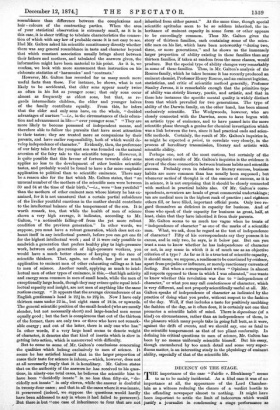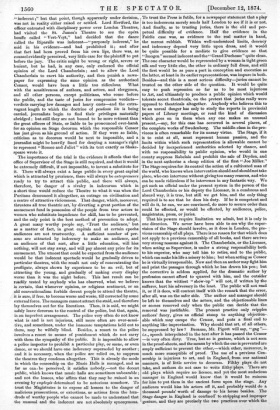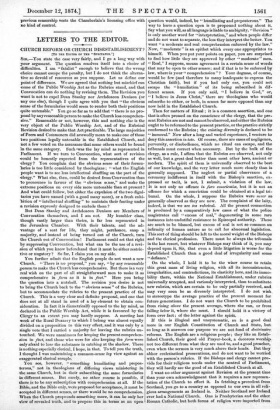DECENCY ON THE STAGE.
THE importance of the case " Fairlie v. Blenkinsop " seems to us to be mainly incidental. As a libel case it was of no importance at all, the appearance of the Lord Chamber- lain as a witness reducing the chance of a verdict hostile to the offending newspaper almost to nothing. It might have been important to settle the limit of indecorum which would justify a journalist in condemning a stage performance as " indecent ;" but that point, though apparently under decision, was not in reality either raised or settled. Lord Hertford, the officer entrusted with disciplinary power over London Theatres, had visited the St. James's Theatre to see the opera bouffe called "Vert-Vert," had decided that the dance called the Riparelle was indecent—" purposely indecent," lie said in his evidence—and had prohibited it ; and after that fact had been proved from his own lips, there was, as counsel evidently perceived, very little case for the plaintiff to put before the jury. The critic might be wrong or right, severe or lenient, but he had, in any case, only endorsed the official opinion of the Lord Chamberlain ; and to allow the Lord Chamberlain to exert his authority, and then punish a news- paper for expressing the same opinion as the authorised Censor, would have been a little too ridiculous. What with the sensitiveness of authors, and actors, and clergymen, and all other persons, except politicians, who come before the public, and the taste of juries for compromise verdicts— verdicts carrying low damages and heavy costs—and the extra- vagant length to which the doctrine of pendente lite is being carried, journalists begin to find their privileges materially abridged ; but still they are not bound to be more reticent than the great officers of State, or liable to be pronounced over-harsh for an opinion on Stage decorum which the responsible Censor has just given as his ground of action. If they were so liable, criticism as to decorum would be next to impossible, and a journalist might be heavily fined for denying a manager's right to represent "Romeo and Juliet" with its text exactly as Shake- speare wrote it.
The importance of the trial is the evidence it affords that the office of Supervisor of the Stage is still required, and that it would be extremely difficult, if not impossible, to invent a substitute for it. There will always exist a large public in every great capital which is attracted by prurience, there will always be entrepreneurs ready to try to attract this public, and there will always, therefore, be danger of a rivalry in indecorum which in a short time would reduce the Theatre to what it was when the Puritans denounced it altogether, an outrage on civilisation and a centre of attractive viciousness. That danger, which, moreover, threatens all true tbeatric art; by diverting a great portion of the amusement fund in possession of the people from true actors to women who substitute impudence for skill, has to be prevented, and the only point is the best method of prevention to adopt. A great many worthy people say, Trust the audience,' but as a matter of fact, in great capitals and at certain epochs audiences are not trustworthy. A sufficient number of per- sons are attracted by indecency to make an audience, and an audience of that sort, after a little education, will hiss nothing, will not stay away, and will pay almost any price for its amusement. The utmost that could be expected from the audience would be that indecent spectacle would be gradually driven to particular theatres, with the result not only of concentrating the profligate, always shown by experience to be an evil, but of attracting the young, and gradually of making every display worse than it was the night before. This last result can be readily tested by anybody who has observed, what we believe is certain, that whenever opinion, or religious sentiment, or an old conventional-44m forbids decent people to attend the theatre, it is sure, if free, to become worse and worse, till corrected by some external force. The managers cannot attract the staid, and therefore lay themselves out for the licentious. Then, it is said, we might safely leave decorum to the control of the police, but that, again, is an imperfect arrangement. The police very often do not know what is and is not injurious, still more often are over-sensi- tive, and sometimes, under the immense temptations held out to them, may be wilfully blind. Besides, a resort to the police involves a resort to means of punishment which do not carry with them the sympathy of the public. It is impossible to allow a police inspector to prohibit a particular play, or scene, or even dance, or we should have one indecency superseded by another ; and it is necessary, when the• police are relied on, to suppress the theatres they condemn altogether. This is already the mode in which the censorship on the Music Halls is managed, and as fax as can. be perceived, it satisfies nobody,—not the decent public, which knows that music halls are sometimes unbearable ; and not the lessees, who affirm that they may be ruined in an evening by employ& determined to be notorious somehow. To trust the Magistrates is to expose all lessees to the danger of malicious prosecutions, or extortions, or actions from the hun- dreds of worthy people who cannot be made to understand that the unusual and the indecent are not absolutely synonymous. To trust the Press is futile, for a newspaper statement that a play is too indecorous merely sends half London to see if it is or not. And finally, as to trusting juries, there is the old and per- petual difficulty of evidence. Half the evidence in the Fairlie case was, as evidence to the real matter in hand, the merest rubbish. Within well-understood limits, decency and indecency depend very little upon dress, and it would be quite possible for a modiste to give evidence so that "Imogen "seemed indecent and the" Grand Duchesse " quite clean. The one character would be represented by a woman in tight green silk and very little else, the other in ordinary full dress, and still the first would be as pure a part in conception and execution as the latter, at least in its earlier representations, was impure in both. Besides—and this is a most serious difficulty—juries cannot be trusted on the other side of the question. It would be quite easy to push repression so far as to be most injurious to Art, and ultimately to produce a public opinion which would tolerate secret theatricals, on the pretext that juries really were opposed to theatricals altogether. Anybody who believes this to be an unreal danger has only to study the reports in provincial papers of Library meetings, or read the kind of discussion which goes on in them when any one makes an unusual present,—say, for this case has occurred in several places, of the complete works of Swedenborg. The middle-class in the pro- vinces is often remarkable for its uneasy virtue. The Stage, if it is to exist at ,all, must represent human passion, and the Emits within which such representation is allowable cannot be decided by inexperienced authorities selected by chance, and with no responsibility to public opinion, who would in one county suppress Rabelais and prohibit the sale of Dryden, and in the next authorise a cheap edition of the first "Joe Miller." The Stage requires for its control the action of a cultivated man of the world, who knows when intervention should and should not take place, who can intervene without givingtoo many reasons, and who can be made ridiculous if he intervenes in any fantastic way. We get such an official under the present system in the person of the Lord Chamberlain or his deputy the Licenser, in a cumbrous and absurd way, it is true, but still we get him, and the only thing required is to see that he does his duty. If he is competent and will do it, he can, we are convinced, do more to secure order than could be effected, or would be effected, by audiences, police,
magistrates, press, or juries. .
That his powers require limitation we admit, but it is only in one direction. We never have been able to see why the super- vision of the Stage should involve, as it does in London, the pre- vious censorship of all plays. Therein no reason for that which does not apply to a previous censorship of all books, and there are two very strong reasons against it. The Chamberlain, or the Licenser, when acting as Supervisor, is under a strong responsibility both to his superior, who may tell him to retire, and to the public, which can make his life a misery to him; but when acting as Censor he is virtually irresponsible. Now and then an author may fight him and print the passages through which he has drawn his pen ; but the corrective is seldom applied, for the dramatic author by profession cannot afford to quarrel with him, and the outsider knows that the wittiest " show-up " will not, if written by the sufferer, hurt his adversary in the least. The public will not read it, or if it does, will content itself with the remark that the error, after all, was on the safer side. The author and manager should be left to themselves and the actors, and the objectionable lines or scenes removed only when the public can decide that the removal was justifiable. The present practice only cripples authors' fancy, gives an official stamp to anything objection- able which may escape the Censor, and puts a final end to anything like improvisation. Why should that art, of all others, be suppressed bylaw? Because, Mr. Pigott will say, " gag "— i.e., speech interpolated in the text after it has passed the Censor —is very often dirty. True, but so is gesture, which is not seen in the proof-sheets, and the means by which the one is prevented are amply sufficient to prevent the other,—which other, moreover, is much more susceptible of proof. The use of a previous Cen- sorship is injurious to art, and in England, from our national manners, is of little service to decorum. Filthy plays do not take, and authors do not care to write filthy plays. There are old plays which require no licence, and yet the most audacious manager in England would know that it would be ruinous for him to put them in the ancient form upon the stage. Any audience would hiss his actors off it, and probably would do a thousand pounds' worth of damage to his house besides. The Stage danger in England is confined- to stripping and improper gesture, and they are precisely the two practices over which the
previous censorship vests the Chamberlain's licensing office with no kind of control.








































 Previous page
Previous page